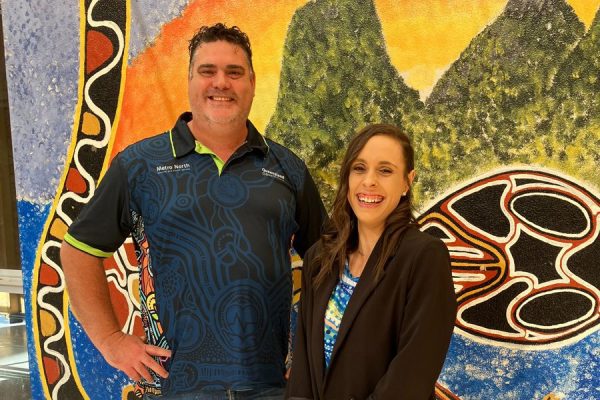Ashleigh and Luke, mental health change makers

Luke Smith and Ashleigh Nadar are new members of the Perinatal Mental Health team
Metro North’s Perinatal Mental Health team understands that Aboriginal and/or Torres Strait Islander mothers and birthing parents experience significant inequities during the perinatal period, with mental health distress continuing as a leading cause of adverse outcomes for these families.
The transition into parenthood can be challenging, and the goal of the service is to provide responsive care that privileges the voices, perspectives, and experiences of Aboriginal and/or Torres Strait Islander mothers and their families in safe and respectful places.
According to Perinatal Wellbeing Team Leader Liz Bennett, the adoption of a multidisciplinary team (MDT) approach that fosters and promotes high standards of care and best practice in the delivery of easily accessible mental health services is an important aspect of the service.
Liz said an MDT that includes staff in identified roles is crucial to engaging with the perinatal community. Senior Identified Health Workers Ashleigh Nadar and Luke Smith recently joined the team.
“The perinatal period is a vulnerable time and the additional of heightened psycho-social stressors can have both immediate and long-term impacts for parents and their children,” Liz said.
“It would be wonderful to think that families exist in bubble of newborn bliss, but unfortunately depression and anxiety are significant health challenges, and early intervention is the key to improving health outcomes.
“For our service to be effective and culturally competent, it’s important to have enthusiastic community champions like Ashleigh and Luke leading conversations, engaging with parents, Elders and community groups, and making sure that traditional knowledge and skills are embedded into the service.”
Luke, a proud Palawa man from Tasmania, was thrilled to join the perinatal mental health team, and said he certainly understands a man’s perspective.
“I’m a father of four teenagers and I originally trained as a chef. As interesting as this job was, I was off land and was becoming culturally disconnected. Since moving into the health support space, I felt I could really contribute to supporting cultural awareness and help influence the health inequities that mob still face,” Luke said.
“Outreach, education, and engagement with men through yarn helps identify opportunities for support or delivery of culturally sound interventions that some fathers (and their families) might need.
“Men in general, but especially ours, can be closed off in medical settings. By building trust in the community, hopefully we are putting men’s issues on the table for support.”
Ashleigh Nadar, a proud Wiradjuri woman from Orange NSW, has always worked with mob, and commenced a career in mental health after having her children.
“Research that has shown that Aboriginal and/or Torres Strait Islander health staff build better connections, rapport and trust with mob which helps to reduce their anxiety and improve communication,” Ashleigh said.
“By contributing to this space, I know I am helping to improve the health outcomes of our people, and in the long-term, I am helping to create better opportunities for young people, including my three-year-old twins.
“Luke and I feel welcomed and culturally valued by the staff of the Perinatal Mental Health team and it’s important to acknowledge this. Without it, the service would not be able have the authentic engagement needed to bring about trust, confidence and change.
“Every day is different for us, and as a team we are not bound by conventional thinking in our goal to provide a culturally appropriate alternative to mainstream health services for Aboriginal and/or Torres Strait Islander mothers/birthing parents and their babies.”
